
The newsletter of UCL Library Services - Issue 30: Spring term, 2012
Inside this issue
|
|
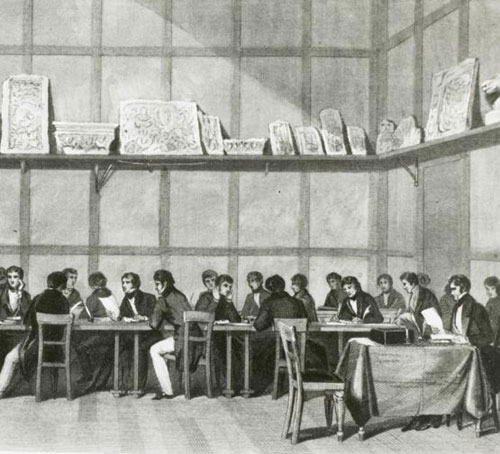 University Examinations, 1842
University Examinations, 1842
|
Getting the most from the Library during the exams
At exam time, being able to make effective use of UCL Library Services is more important than ever. Here are some tips to try to help you through.
1. Check your Library Account at least once a week
Standard loan books can be recalled after one week and are more likely to be requested by other readers during the exam period. Check your e-mails and your library account regularly to make sure you know when your books are due for return. You can check your account online through the Library Catalogue. If you are unsure or have concerns about your borrowing account, ask Issue Desk Staff for help.
2. Use the advance booking system for short loans
The short loan (3 hour and 2 day) materials that make up the Science Library Short Loan Collection and the Issue Desk collections are usually in high demand and may be difficult to get hold of, so place an advance booking. It’s like making a request, but you can select the time period when you want to borrow the book. Look for Issue Desk or Science Short Loan Collection as a location and request that particular copy.
3. Remember that 3 hour loans can also be borrowed overnight or over the weekend
4. Libraries are open throughout the vacation but closed during the UCL’s Easter Closure period
Check on the opening hours of all UCL Libraries. Main and Science Libraries are open 24 hours (week nights) until 2nd June
5. Use e- resources
Many journals are available as e-journals and we have a growing collection of e-books, as well as our research databases. Always start from the Library Services website. You can also find exam papers online
6. Remember the Library does not manage general computing.
Details of the Information Systems Division and their Service Desk’s opening hours can be found at http://www.ucl.ac.uk/isd/servicedesk
by Caroline Fletcher
Special Collections go to France
In early February a group of us from Library Services and Museums and Collections travelled to Paris, along with several specially chosen treasures, to attend a reception at the Prime Minister’s official residence, Hotel de Matignon. During the evening the award of Chevalier de la Légiond’Honneur, France’s highest decoration, was presented to Professor Michael Worton, Fielden Professor of French Language and Literature and Vice-Provost (International) UCL by Prime Minister Francois Fillon.
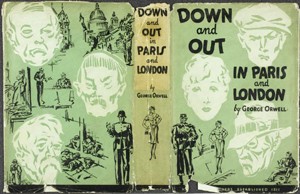 Completed in 1725, the Hotel de Matignon was presented as a birthday gift to the Duke of Valentinois by his father the Count of Matignon. Its ownership and purpose changed several times over the centuries, including passing into the hands of Napoleon’s Foreign Minister, Talleyrand, in 1808, and acting as an Embassy of the Austro-Hungarian Empire during the First World War. In 1935 it became the residence of the President of the Council under the Third Republic and has been the residence of the French Prime Minister since 1947.
Completed in 1725, the Hotel de Matignon was presented as a birthday gift to the Duke of Valentinois by his father the Count of Matignon. Its ownership and purpose changed several times over the centuries, including passing into the hands of Napoleon’s Foreign Minister, Talleyrand, in 1808, and acting as an Embassy of the Austro-Hungarian Empire during the First World War. In 1935 it became the residence of the President of the Council under the Third Republic and has been the residence of the French Prime Minister since 1947.
After a few weeks of hectic preparation work the trip itself started very early in the morning on the day of the event for all the UCL staff, with myself, Andrea Fredericksen (Art Curator), and Henry Woudhuysen (Dean of the Faculty of Arts and Humanities) arriving in Paris’s Gare du Nord just before mid-day. And what a trip it turned out to be. The itinerary was non-stop from the moment we got there, with only a short time to get re-acquainted with the milieu before a quick change at the hotel and on to the venue.
Asking a Parisian cab-driver to take you to the Prime Minister’s residence, just as the sun is setting on a freezing cold day in one of the world’s, if not the world’s, greatest city, and seeing its iconic landmark buildings flash by one by one, is not something you get to do every day. Ben Meunier had accompanied the items in the transit vehicle directly to the venue for setting up in the exhibition space, while myself and one of the other curators, Celine West, arrived later to see the UCL contingent busying themselves with getting everything just right for the big event. Several people remarked how it was not unlike the final preparations for a wedding, even down to the red rose boutonnieres we were all given to wear.
 Before we set foot in the Hotel de Matignon, there were the inevitable elaborate security checks at the gate but at last we were directed through to the grand entrance. The sumptuous décor of the rooms was a sight to behold and truly a fitting setting to show off our treasures; a Turner painting, a 3000-year-old Egyptian necklace, a volume of letters of Emile Zola, a beautiful Book of Hours printed in Paris in 1509, a pocket-sized polyglot dictionary from 1558, and a letter of 1929 sent to George Orwell during his early days in Paris, to name a few. They all attracted a great deal of attention, once the speeches and presentation were over and the guests had filtered through after (and without) their champagne and oyster canapés. The Zola letters aroused the most interest, as he is revered as one of France’s greatest novelists, and Special Collections also provided an image of the cover of the first US edition of Orwell’s Down and Out in Paris in London from 1933, which was chosen to be mounted and framed as a gift to Madame Fillon, a former student of UCL’s French Department.
Before we set foot in the Hotel de Matignon, there were the inevitable elaborate security checks at the gate but at last we were directed through to the grand entrance. The sumptuous décor of the rooms was a sight to behold and truly a fitting setting to show off our treasures; a Turner painting, a 3000-year-old Egyptian necklace, a volume of letters of Emile Zola, a beautiful Book of Hours printed in Paris in 1509, a pocket-sized polyglot dictionary from 1558, and a letter of 1929 sent to George Orwell during his early days in Paris, to name a few. They all attracted a great deal of attention, once the speeches and presentation were over and the guests had filtered through after (and without) their champagne and oyster canapés. The Zola letters aroused the most interest, as he is revered as one of France’s greatest novelists, and Special Collections also provided an image of the cover of the first US edition of Orwell’s Down and Out in Paris in London from 1933, which was chosen to be mounted and framed as a gift to Madame Fillon, a former student of UCL’s French Department.
Among the 100 plus attendees were several former UCL students, one of whom was fascinated to see an early English translation edition of Montaigne’s Essayes. It sparked happy memories for her of her time at UCL, relating how she had hung onto her own copy of the work as it was so special. Everyone remarked on the wonderful experience of seeing and touching the original items, and how they were unaware that such items existed and were looked after in UCL’s collections.
After a long but enjoyable and very successful evening from every point of view (the Matignon staff liked us so much they gave us drinks and a meal - I hasten to add we’d packed all the items away by then) we made our way back to the hotel in the Opera district, and the next morning there was just enough time to walk as far as the fabulous Jardin des Tuileries and soak up some of the city’s sights on the way, before heading off to catch the Eurostar back to London.
by Gill Furlong
Masterplan Updates and a New Look for the Institute of Archaeology Library
Re-opening the Flaxman Gallery oculus
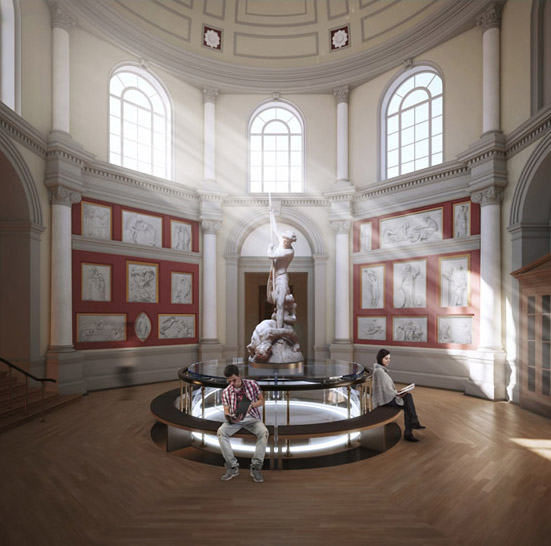
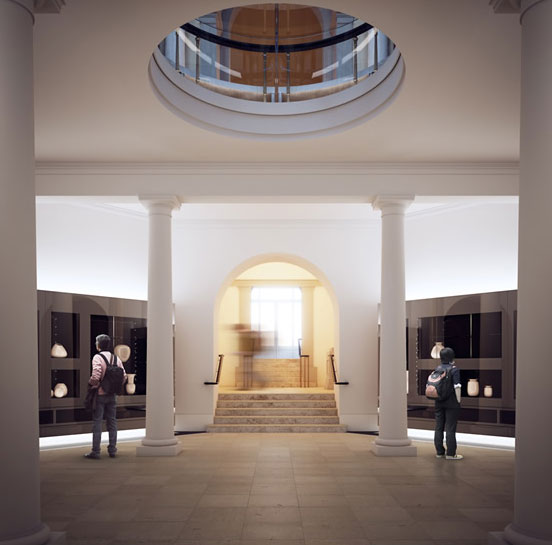 A stunning new glass pedestal is being planned for construction in the Flaxman Gallery in summer 2012. One of the UCL Masterplan’s first major schemes to be implemented, the project will open up visual links between the dome, the Main Library, and a new exhibition space in the Octagon at ground floor level. Readers will also be able to plug in their laptops on the new circular bench.
A stunning new glass pedestal is being planned for construction in the Flaxman Gallery in summer 2012. One of the UCL Masterplan’s first major schemes to be implemented, the project will open up visual links between the dome, the Main Library, and a new exhibition space in the Octagon at ground floor level. Readers will also be able to plug in their laptops on the new circular bench.
UCL Estates are working with Library Services and other departments to minimize disruption. The statue of St Michael is due to be removed, temporarily, during the Easter closure period. Hoardings will go up after Easter, and building works will be completed by the start of the 2012-13 academic year.
Building works in the Flaxman Gallery are scheduled for the following dates/times:
- Library Easter closure from 5/4/12 to 11/4/12 – Temporary relocation of St Michael near to Jewish Studies staircase and hoarding-up of the area around the circular bench
- Weekend nights 9pm to 11am – Opening up work
- Weekday early mornings 4 am - 8 am from 10/4/12 to 27/5/12 – Opening up work (No noisy works permitted outside of these hours from 10/4/12 until 3/6/12)
- Commencement of 8am - 5pm Site Hours from 4/6/12 until 28/9/12
Access across the Flaxman Gallery will be retained throughout the duration of this project.
UCL Institute of Archaeology Library
 The Issue Desk has been reconfigured to improve the layout of the Reader Services Area and a new glass partition has been erected to reduce noise in the reading space.
The Issue Desk has been reconfigured to improve the layout of the Reader Services Area and a new glass partition has been erected to reduce noise in the reading space.
UCL Cruciform Hub
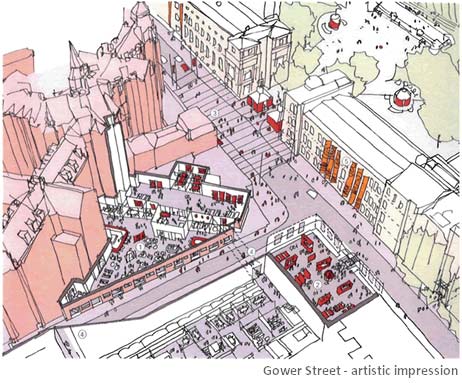 The UCL Masterplan introduces the concept of “hubs” across the Bloomsbury campus. As part of the first phase of the Masterplan implementation, UCL has allocated funding to improve the underground links to the Rockefeller Building and Medical School and to convert the library into a Medical Hub, incorporating project learning space, suited to the new MBBS 2012 programme.
The UCL Masterplan introduces the concept of “hubs” across the Bloomsbury campus. As part of the first phase of the Masterplan implementation, UCL has allocated funding to improve the underground links to the Rockefeller Building and Medical School and to convert the library into a Medical Hub, incorporating project learning space, suited to the new MBBS 2012 programme.
Ben Meunier and Kate Cheney are representing Library Services on the Project Board, alongside UCL Estates, academics, students and Information Services. It is anticipated the building works will be carried out in summer 2013, to ensure adequate time to liaise with stakeholders and to develop a robust brief which fulfils the aspirations of the Masterplan and of users of the facility. There is the opportunity to explore a pilot project in summer 2012, for instance to trial new furniture or group working in a specific area.
by Benjamin Meunier
Helping us to Design a New Cruciform Hub - Survey Results
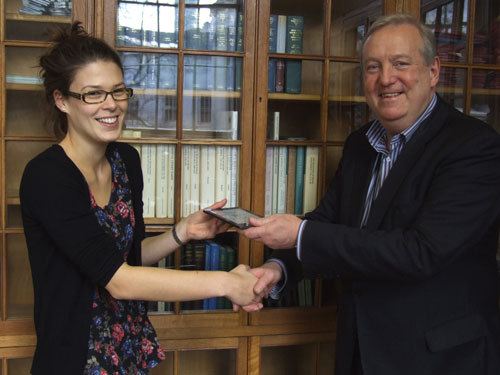 The Cruciform Library has been prioritised for refurbishment in the UCL Masterplan and will be re-designed to improve student- and academic-oriented facilities in the Cruciform Building. An Opinio survey was conducted in November 2011, to help us in planning the new Hub which will open in 2013.
The Cruciform Library has been prioritised for refurbishment in the UCL Masterplan and will be re-designed to improve student- and academic-oriented facilities in the Cruciform Building. An Opinio survey was conducted in November 2011, to help us in planning the new Hub which will open in 2013.
We were very pleased to receive over 1,000 responses and a report on the survey findings is available here:
http://www.ucl.ac.uk/library/cruci-survey-results-2011.pdf
The winner of the prize draw was Emily Thorpe, who received an Amazon Kindle from the Director of Library Services, Dr Paul Ayris, on 7 December.
We would welcome your thoughts on the plans so please send any further comments or suggestions to Kate Cheney at the Cruciform Library.
by Kate Cheney
Spotlight on… Moorfields Eye Hospital's Museum
On 09 December 2011 Moorfields Eye Hospital unveiled its first museum. Moorfields Museum is situated in the Joint Library of Ophthalmology at the UCL Institute of Ophthalmology in Bath Street, London EC1V 9EL.

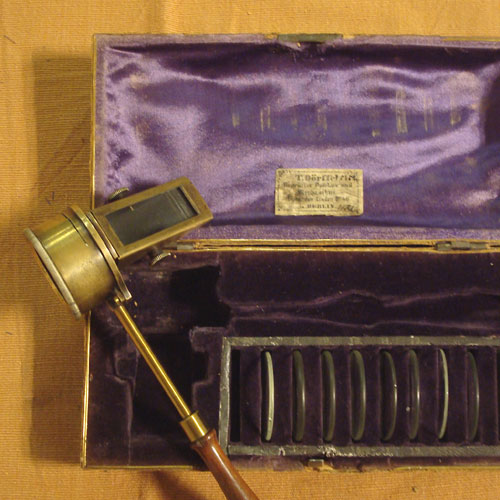 Moorfields Eye Hospital was founded in 1804 as The London Dispensary for Curing Diseases of the Eye and Ear by John Cunningham-Saunders and John Farre to treat returning troops from the Napoleonic wars who had Egyptian Ophthalmia, a contagious and blinding condition. The London Dispensary for Curing Diseases of the Eye and Ear opened at 40 Charterhouse Square in 1805. In 1821 the hospital moved to larger premises near Finsbury Circus known as lower Moorfields, then grazing land for animals. In 1899 the land was sold and ‘Moorfields’ moved to City Road where it is today. Moorfields Eye Hospital is the oldest eye hospital in the world.
Moorfields Eye Hospital was founded in 1804 as The London Dispensary for Curing Diseases of the Eye and Ear by John Cunningham-Saunders and John Farre to treat returning troops from the Napoleonic wars who had Egyptian Ophthalmia, a contagious and blinding condition. The London Dispensary for Curing Diseases of the Eye and Ear opened at 40 Charterhouse Square in 1805. In 1821 the hospital moved to larger premises near Finsbury Circus known as lower Moorfields, then grazing land for animals. In 1899 the land was sold and ‘Moorfields’ moved to City Road where it is today. Moorfields Eye Hospital is the oldest eye hospital in the world.
Among the many items of historical interest on display are:
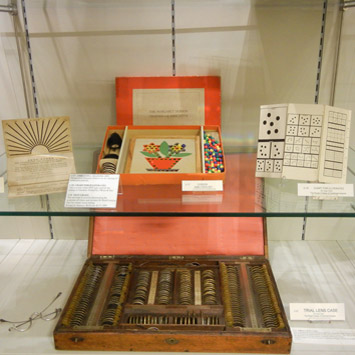
- A rare Hermann von Helmholz (1821-1894) ophthalmoscope 1850. Helmholz was a young professor of Physiology when he invented the Ophthalmoscope in 1850. This instrument was to herald the start of modern ophthalmology as it allowed ophthalmologists to see the fundus (the back of the eye).
- 19th century ivory handled surgical instruments.
- A children’s amblyopia training game used to treat amblyopia (lazy eye). The game consists of coloured pictures on perforated boards in which beads of matching colours are placed. The good eye is covered and the lazy eye has to ‘play’ the game.
- Eskimo shades. These were used before sunglasses were widely used. The ones on display are made of wood and are designed to reduce the glare in snowy conditions and avoid snow blindness.
- A watercolour painting of the back of the eye (fundus) dated 1888 by Arthur Head (1859 – 1930). He was an outstanding artist and painted all the fundi illustrations for Casey Wood’s book The fundus oculi of birds, 1917 and the fundi of mammals for G. Lindsay Johnson’s book Ophthalmoscopic studies on the eyes of mammals. An article written about his adventures painting the fundi of wild animals in captivity makes interesting and enjoyable reading (Pearson’s Magazine July – December 1902). In one image he is sitting with a chimpanzee who insisted on examining Head’s eyes through the ophthalmoscope before he would allow his own eyes to be looked at.
The Museum was created by Mr Richard Keeler and was sponsored by Moorfields Alumni Association, Moorfields Surgeons’ Association, Moorfields Special Trustees and the Joint Library of Ophthalmology.
To arrange a visit to the Museum please contact the Library
- Email ophthlib@ucl.ac.uk or phone 020 7608 6814
by Debbie Heatlie
Library Services celebrates the launch of ReadingLists@UCL
 Colleagues from across UCL joined Professor Anthony Smith (Vice-Provost Education) and Dr Paul Ayris (Director, UCL Library Services) on February 21 st to celebrate the launch of UCL’s new online reading list system – ReadingLists@UCL. Both Professor Smith and Dr Ayris spoke of the strategic importance of the new service for UCL and also highlighted the considerable benefits that the system provides for UCL students and academics alike. Alongside the formal speeches, a short promotional film was premiered; this can be viewed from the ReadingLists@UCL webpage.
Colleagues from across UCL joined Professor Anthony Smith (Vice-Provost Education) and Dr Paul Ayris (Director, UCL Library Services) on February 21 st to celebrate the launch of UCL’s new online reading list system – ReadingLists@UCL. Both Professor Smith and Dr Ayris spoke of the strategic importance of the new service for UCL and also highlighted the considerable benefits that the system provides for UCL students and academics alike. Alongside the formal speeches, a short promotional film was premiered; this can be viewed from the ReadingLists@UCL webpage.
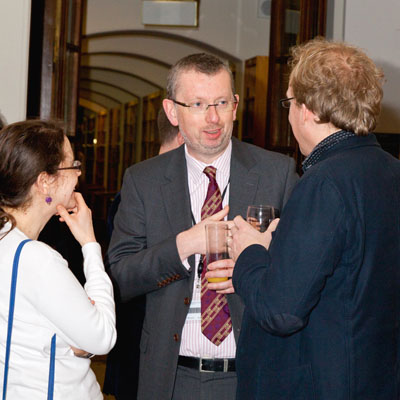 Members of the Library’s Academic Support Group were on hand to tell guests from academic departments more about the service and how they can begin to use ReadingLists@UCL to support their students. The service provides an online version of a course reading list, complete with direct links to the full-text of course readings wherever available, and live look-ups of the UCL Library Catalogue to help students locate books quickly. Early feedback from students using the service in Term 1 shows that they are keen to see more widespread use of the service, with 94% of those responding saying that they would like an online list for all of their modules.
Members of the Library’s Academic Support Group were on hand to tell guests from academic departments more about the service and how they can begin to use ReadingLists@UCL to support their students. The service provides an online version of a course reading list, complete with direct links to the full-text of course readings wherever available, and live look-ups of the UCL Library Catalogue to help students locate books quickly. Early feedback from students using the service in Term 1 shows that they are keen to see more widespread use of the service, with 94% of those responding saying that they would like an online list for all of their modules.
For more information on ReadingLists@UCL, including how to get started with the system, please visit our service webpage:
by June Hedges
Profile - Richard Jalowik, Head of Cataloguing Operations
 My first job after finishing the postgraduate library course at Manchester Metropolitan University in 1995 was a 2-year retrospective cataloguing conversion project at the Ashmolean Library in Oxford. This involved making 10,000+ previously uncatalogued items available on the automated library system from catalogue cards and hand lists.
My first job after finishing the postgraduate library course at Manchester Metropolitan University in 1995 was a 2-year retrospective cataloguing conversion project at the Ashmolean Library in Oxford. This involved making 10,000+ previously uncatalogued items available on the automated library system from catalogue cards and hand lists.
I joined UCL Library Services in 1997 as a Senior Library Assistant in the CCU (Central Cataloguing Unit) and following a review and restructuring exercise in 1999, I became Head of Current Cataloguing. Since 2003 I’ve been Head of Cataloguing Operations.
Cataloguing Operations is part of Bibliographic Services and is responsible for acquiring (purchasing), cataloguing (making items discoverable on the UCL Library Catalogue), processing (adding all relevant labels, stamps and security tags) and binding (repairing) monographs and textbooks on behalf of the central Bloomsbury sites to support teaching, learning and research at UCL.
Cataloguing Operations comprises a number of teams; Current Cataloguing, Retrospective Conversion, Acquisitions (now including monograph binding preparation) and Processing, all of which are based nowadays on the 4th Floor of the Science Library, although Processing also has office space in the Main Library.
As Head of Cataloguing Operations, I line manage the Acquisitions Librarian and the Heads of Current Cataloguing and Retrospective Conversion. To give some idea of the volume of work that is undertaken, around 18,000-20,000 new monographs are accessioned, catalogued and processed each year. In addition some 6,000 items are catalogued by the Retrospective Conversion team. UCL Library Services catalogue all items according to a number of internationally recognised rules and standards and all headings added to the Catalogue (e.g. names and subjects) are reviewed constantly to ensure consistency and to maximise the search and discovery experience for all users.
In recent years Cataloguing Operations has acquired and catalogued a rapidly increasing number of e-books. During this time my role has developed so that I’m now responsible for administering the library’s e-book service. This involves, among other things, obtaining quotes for e-book packages and individual titles, arranging trials, ordering titles, ensuring that they are catalogued (where appropriate) and activated in SFX to ensure optimum access, checking licence agreements, liaising with publishers and vendors, generating usage statistics and advising the Academic Support Group. This takes up an increasing amount of my time as this is an area that continues to expand and it will be interesting to see to what extent UCL’s e-book coverage develops over the course of the next few years.
by Richard Jalowik
Scifinder
 We are now able to offer all staff and students of UCL access to SciFinder, a key chemistry database. It recently moved to a web based platform, and now allows unlimited concurrent users, which is great news for all those linked with chemistry research. So what can you expect to find with Scifinder?
We are now able to offer all staff and students of UCL access to SciFinder, a key chemistry database. It recently moved to a web based platform, and now allows unlimited concurrent users, which is great news for all those linked with chemistry research. So what can you expect to find with Scifinder?
It includes scientific information in journals and patent literature from around the world. As well as being useful for chemists there is considerable information for biologists and pharmacists as it covers areas such as diseases and metabolic pathways, gene expressions and gene therapy and drug-target interactions.
One of the key features used by chemists is the synthesis planner SciPlanner.
To use Scifinder you need to register, so full details on how to do that are available in the Chemistry Subject Guide.
For more information on Scifinder:
- Please email Lynne Meehan
by Lynne Meehan
UCL Library Services Strategy and relaunched Annual Report
The UCL Library Services Strategy 2011-2014 can be found on the Library website. Further details about the backgrou
nd to the current Strategy are given in our most recent Annual Report.
Editorial board members:
Chris Carrington, Deborah Furness, Hazel Ingrey, Nova Larch, Robbie Lumsden, Diana Mercer, Martine Painter, Ruth Russell, Margaret Stone, Zoe Thomas & Ben Woods.
 Top of page Top of page
Issue 30 - Spring term, 2012
|

